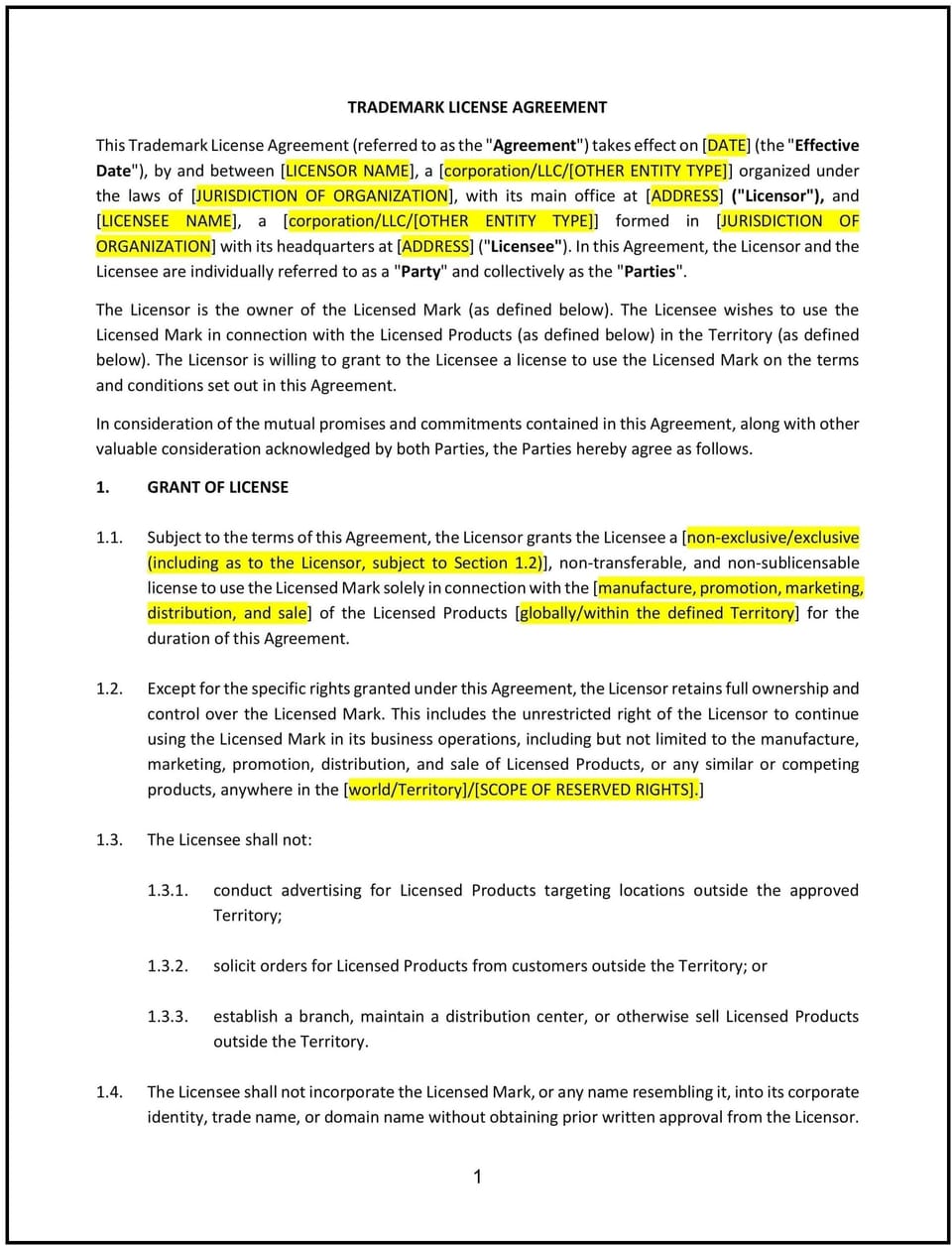Trademark License Agreement (Pro-Licensor) (Mississippi): Free template

Trademark License Agreement (Pro-Licensor) (Mississippi)
A Trademark License Agreement is a legally binding contract between a trademark owner (licensor) and a third party (licensee), granting the licensee the right to use the trademark under specific terms and conditions. In Mississippi, this type of agreement is commonly used in industries like agriculture, manufacturing, and retail to protect the licensor’s brand while generating revenue through licensing. A Pro-Licensor Trademark License Agreement prioritizes the licensor’s interests, ensuring control over how the trademark is used and protecting its value.
Mississippi’s economy, with strong sectors in agriculture, manufacturing, and healthcare, makes trademark licensing an attractive option for businesses looking to expand their brand presence. However, licensors must ensure compliance with state-specific laws, such as Mississippi’s trademark registration requirements under the Mississippi Secretary of State’s Office and consumer protection statutes. A well-drafted Trademark License Agreement protects the licensor’s intellectual property and ensures clarity in the licensing relationship.
Tips for drafting and maintaining a Trademark License Agreement in Mississippi (Pro-Licensor)
- Define the scope of the license clearly: Specify the trademark(s) being licensed, the geographic area of use, and the products or services covered. For example, if the trademark is for a food product, outline whether the license applies to all food items or specific categories like snacks.
- Include quality control provisions: Ensure the licensee maintains the quality standards associated with the trademark. For instance, require the licensee to submit samples for approval and allow the licensor to inspect the licensee’s facilities.
- Address royalty payments: Outline the payment structure, including royalty rates, payment deadlines, and reporting requirements. For example, specify that royalties will be paid monthly based on net sales.
- Include termination clauses: Specify the conditions under which the licensor can terminate the agreement, such as breach of contract or failure to meet quality standards. Outline any penalties or payments due upon termination.
- Comply with Mississippi laws: Ensure the agreement adheres to Mississippi’s trademark registration requirements and consumer protection statutes. For example, Mississippi requires trademarks to be registered with the Secretary of State’s Office, and licensors must ensure the trademark is properly maintained and renewed.
- Regularly review and update: Periodically update the agreement to reflect changes in the scope of the license, business needs, or legal requirements. For example, if the licensor expands the trademark to new product categories, amend the agreement to include these.
Frequently asked questions (FAQs)
Q: What should a Trademark License Agreement include in Mississippi?
A: It should include the scope of the license, quality control provisions, royalty payment terms, termination clauses, and compliance with Mississippi laws. Additionally, it should specify how disputes will be resolved.
Q: How does Mississippi law impact Trademark License Agreements?
A: Mississippi’s trademark laws emphasize the importance of proper registration and protection of intellectual property. Businesses must ensure the agreement complies with state registration requirements and consumer protection statutes. For example, trademarks must be registered with the Mississippi Secretary of State’s Office and renewed every 10 years.
Q: Can a Trademark License Agreement be terminated early in Mississippi?
A: Yes, if the agreement includes a termination clause, the licensor can terminate the contract with reasonable notice. The terms should specify any penalties or payments due upon termination, ensuring fairness for both parties.
Q: What industries commonly use Trademark License Agreements in Mississippi?
A: Industries like agriculture, manufacturing, retail, and healthcare frequently use Trademark License Agreements in Mississippi. For example, a food brand might license its trademark to a manufacturer, while a healthcare provider might license its logo for use on medical devices.
Q: How can businesses ensure compliance with Mississippi laws in Trademark License Agreements?
A: Businesses should ensure their agreements comply with Mississippi’s trademark registration requirements and consumer protection statutes. Regularly reviewing and updating the agreement is also essential to maintain compliance.
This article contains general legal information and does not contain legal advice. Cobrief is not a law firm or a substitute for an attorney or law firm. The law is complex and changes often. For legal advice, please ask a lawyer.


